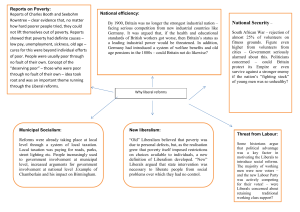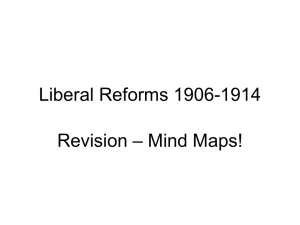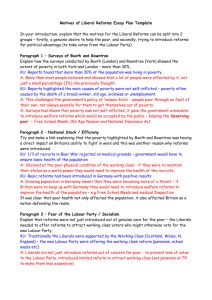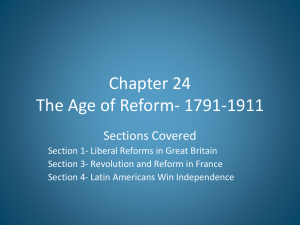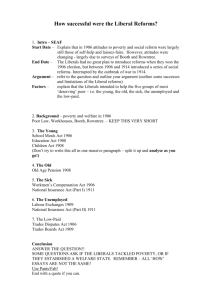“How successfully did the Liberal reforms of 1906-1914
advertisement
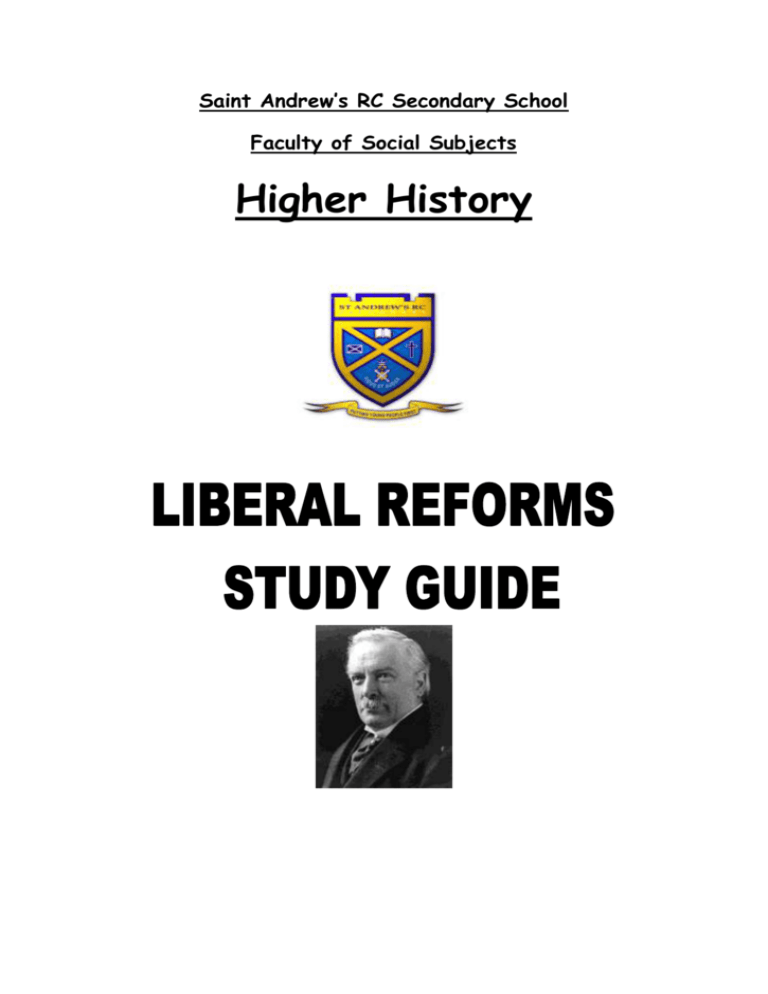
Saint Andrew’s RC Secondary School Faculty of Social Subjects Higher History ISSUE 4 – Why did the Liberal government of the early 20th century become involved in passing social reforms? POVERTY KU: two social surveys published, that shocked Britain and its opinion of poverty: Seebohm Rowntree (York) - 30% Charles Booth (London) - 35% A: shows poverty was much worse than estimated 3% people were usually poor through no fault of their own – “DESERVING POOR” KU: not self-inflicted, main causes: LOW PAY, ILLNESS, AGE & UNEMPLOYMENT A: cures for this were beyond individual efforts of poor A: People shocked by findings, gave MANDATE for LIMITED reform. NATIONAL SECURITY/STOCK KU: South African Boer War – 25% of volunteers rejected on fitness grounds fears that Britain was in decline as a world power A: government and public alarmed – must implement steps (like free school meals) to improve the quality of the “fighting stock” to protect the Empire. NATIONAL EFFICIENCY KU: 1900, Britain no longer world’s strongest industrial power competition from Germany (introduced a system of welfare benefits & pensions) & US (Churchill & Lloyd-George impressed) A: It was argued, if the health and educational standards of British workers got worse, then Britain’s status as a leading industrial power would be threatened. For Britain to remain a strong power it would need strong, healthy and well-educated workforce. POLITICAL ADVANTAGE KU: Labour Party established, gaining public support with social welfare campaigns (unemployment benefit & pensions) – fear of losing votes A: To counter, Liberals had to instigate social reforms or risk losing working class support Liberals tried to buy off voters with small reforms to avoid bigger ones. KU: Fear of Socialism, a Labour govt would introduce higher taxes to pay for more widespread Reforms. A: Liberals passed small scale reforms to avoid larger more costly labour reforms. Liberal reforms were put in place to avoid Labour stealing their voters. NEW LIBERALISM KU: “Old” Liberalism believed that poverty was due to personal defects – Laissez Faire. A: “New” Liberals argued that state intervention was necessary to liberate people from social problems over which they had no control. A: Moreover, younger Liberal politicians like Churchill & Lloyd George genuinely wanted to help the poor e.g. Lloyd George represented a poor area of Wales. A: But they also wanted to make a name for themselves, by pressing for reforms, like school meals, they were noticed and gained vote. Some of the Liberal reforms were politically motivated to allow young politicians like Lloyd George to increase their influence in the Liberal party instead of the ‘old guard’. K: Municipal socialism - Birmingham. Using local taxation to improve things like water supply, street lighting, public libraries etc. A: Example to National government that political intervention was both possible and desirable. ISSUE 4 – Possible essay titles 1. To what extent did political advantage force the Liberals into a programme of social reform from 1906? 2. How far were the reports on poverty produced by Booth and Rowntree responsible for the Liberal social reforms of 1906-1914? 3. How important were concerns about the extent of poverty in Britain in the Liberal Government’s decision to introduce social reforms between 1906 and 1914? 4. “Simply a response to the growth of the Labour movement.” How adequate is this explanation for the social reforms of the Liberal government between 1906 and 1914? 5. To what extent were the Liberal social reforms of 1906-1914 a response to the challenge from the Labour Party? 6. How important were concerns about the extent of poverty in Britain in the Liberal Government’s decision to introduce social reforms between 1906 and 1914? MODEL ANSWER - How far were the reports on poverty produced by Booth and Rowntree responsible for the Liberal social reforms of 1906-1914? Between 1906 and 1914 the Liberal government introduced a series of social reforms, which were a significant move away from the ideology of laissez-faire, as the government took greater responsibility for looking after the poor in society. There were a number of reasons for the Liberal Social Reforms – both humanitarian and politically motivated reasons. An extremely important humanitarian reason was the surveys produced by Charles Booth and Seebohm Rowntree, in the late nineteenth century. These surveys highlighted the true extent of poverty in Britain and also concern that poverty was not always self-inflected, In turn, this led to the movement away from the laissez-faire attitude by the Liberal Government as they realised something had to be done to help those living in poverty, through no fault of their own. However, the reports by Booth and Rowntree were only responsible for the Liberal Reforms to an extent, as there were other significant motives. A further humanitarian reason was the concern of national stock/efficiency. At the time Britain was involved in the Boer War and many potential recruits were rejected on medical grounds which was a major concern for the government at the time as it signified the lack of good health in the population. On the other hand, a political reason for the introduction of the Liberal Reforms was the fear of the new Labour Party stealing the working class vote from the Liberals. Finally, the last political motivation reason was the concept of New Liberalism which was used by ambitious members of the Liberal Party to raise their profile. Before the Liberal government of 1906 –1914 most governments had followed a policy of Laissez-faire as they believed poverty was very low, around 3% and most poverty was self-inflicted through alcohol, laziness, immorality etc. Charles Booth and Seebohm Rowntree both published surveys at the end of the nineteenth century that not only shocked the British public on the extent but also changed popular opinion on the causes of poverty. Booth conducted his research in London and found that 35% of the population was living in poverty and Rowntree’s investigation in York discovered that 30% of the population was living in poverty. This proved that the government estimation of 3% of the population living in poverty was completely inaccurate. In turn, the reports showed how big the problem of poverty really was and dispelled the idea that most poverty was self-inflicted. The extent of poverty shocked the British public and gave the Liberal government strong support for limited reform. In addition, both Booth and Rowntree identified the main causes of poverty as being illness, unemployment and age – both the very young and very old were at greatest risk of poverty. This in turn highlighted to the government and the public that poverty was not self-inflicted as society had imagined and this was important in attacking the idea of laissez-faire government. It was clear that the findings of these surveys not only shocked society but also shocked the government and gave the new Liberal government a mandate to introduce some welfare measures like free school meals and pensions clearly out of genuine concern for the poor. Therefore, the reports published by Booth and Rowntree were partly responsible for the Liberal Social Reforms of 1906-1914 and were very important in contributing to the reasons for the introduction of these reforms by highlighting the extent of poverty along with it’s reasons to both the public and the Government. Another humanitarian factor responsible for the introduction of the Liberal Social Reforms of 1906-1914 was the Government’s concern over the national stock and the strength and efficiency of the working class compared to Britain’s rivals. From 18991902 Britain was involved in the Boer War and during which the British Army experienced great difficulty in finding fit young men to recruit as soldiers. One in three potential recruits were refused on medical grounds which led to questions being asked about the physical condition of the working class male. The general poor health of the population forced the Liberal Government to realise that something had to be done to improve health conditions in the country and gave them an incentive to introduce the Liberal Reforms. The fact that Britain could not find recruits also alarmed the Government by raising the possible decline of Britain as a world power. It was felt that countries, especially Germany, were pulling ahead of Britain. Liberal politicians like Winston Churchill and Lloyd George had visited Germany and were impressed by the effects of German welfare reforms on the nation’s health, like pensions and free school meals. Therefore, the reports on poverty were not the only reasons for the Liberal Reforms, as the British Government realised that the reforms like free school meals or school medical inspections would have to be introduced to build up the national stock of the population if Britain was going to remain as a strong world power. However political motivation was also a factor that was responsible for the introduction of the Liberal Social Reforms. The fear of the Labour Party and Socialism was a factor in the limited Liberal reforms. The Liberal Party were traditionally supported by the working class especially in areas like Scotland, Wales and Northern England and recognised the threat the Labour Party posed to it’s working class support. The Labour party had just been established but was growing and winning working class support for its campaigns for social welfare policies such as old age pensions and unemployment benefits. To counter the threat from socialism and the Labour movement, the Liberals realised that they had to instigate social reforms or risk losing support from the working class. The Liberals tried to attract votes with limited reform like setting pensions at the age of 70 to avoid more expensive pensions proposed by the Labour party. The reports on poverty were not solely responsible for the Liberal Reforms, as the Liberal government was pushed into moving away from laissez-faire out of fear that the new working class voters would turn to the Labour Party. It was also felt that it would be better for the Liberals to pass cheaper and more limited reforms rather than wait for costlier Socialist policies to be passed by a future Labour government. On the other hand a strong political motive for the introduction of the Liberal Social Reforms of 1906-1914 was the concept of New Liberalism. Old style Liberalism was not appealing to the recently enfranchised working class voters because it focused on middle class concerns such as Home Rule in Ireland, Free Trade and the Empire. By 1906 a new type of Liberalism emerged and this provided inspiration for reform. New Liberals such as Lloyd George, Winston Churchill and Herbert Asquith argued that there were circumstances in which it was right for the state to intervene in people’s lives. In 1900, when old Liberal PM Campbell Bannerman died the new Prime Minister HH Asquith appointed Lloyd George and Winston Churchill to important positions, there was suddenly a growth of social reforms. The New Liberals represented poorer areas (Lloyd George in Wales and Winston Churchill in Dundee) and saw reforms were needed. The New Liberal politicians wanted to have more of a name for themselves so by pressing for reforms like pensions and free school meals they would get noticed by the public and increase their standing in the Liberal Party. They also felt they needed to introduce these limited welfare reforms to help working class voters who would in turn continue to vote Liberal and not Labour. New Liberals had an example of limited municipal socialism in Liberal controlled town councils, like Birmingham. They served as a good example to national government that political intervention to tackle poverty was both possible and desirable. In Birmingham, local taxation was used to ensure clean water supplies, street lighting and public libraries. Therefore, the reports on poverty cannot be given all the credit for the Liberal Reforms, as ‘New Liberalism’ brought about fresh ideas and new attitudes towards poverty by realising reforms were vital for the Liberal Party to maintain working class votes and would help the careers of ambitious Liberal politicians. In conclusion, both humanitarian concerns and political motives led to the passing of the Liberal Social Reforms of 1906-1914. On the one hand, the surveys published by Booth and Rowntree shocked the public that 30% of the population were living in poverty, and the fact that it was not mainly self-inflicted, giving the Government a mandate to introduce reforms. On the other hand, the reports alone were not responsible for the Reforms, as several other reasons contributed. Fear about national stock and efficiency was also a motive, as the government became worried about the health of the population as a threat to the position of the country as a world power both in trade and war. The fear of the Labour Party was also important as the Liberal party wanted to retain the working class vote and in order to do so they had to introduce reforms based on the Labour policies to appease working class voters. Finally, the last political motive was ‘New Liberalism’, as new Liberal politicians changed the focus of the party from Home Rule to issues that concerned the population such as helping those in poverty by the introduction of reforms such as school meals. Therefore, not only the findings of both Booth and Rowntree’s surveys were responsible for the introduction of the Liberal Social reforms to an extent as other humanitarian and political motives also contributed to the passing of the reforms of 1906-1914. ISSUE 5 – How effectively did the Liberal reforms deal with the problem of poverty in early 20th century Britain? Background LIMITED success in combating problems outlined in studies of Booth and Rowntree KU: Mention problems/5 evils: Squalor/slums, Disease, ignorance/poor education, Want/poverty & Idleness/unemployment. OLD KU: Old Age Pensions Act 1908 gave over 70s, 5 shillings per week & married couples = 37.5p A: Was of some help, did improve living conditions, better than workhouse/ poorhouse previously A: LIMITED as it was not enough to sustain a person above Rowntree’s poverty line A: The average working-class male life expectancy in 1900 was 51, so this reform failed as it benefited very few people especially men A: some qualification rules, which excluded some of the elderly e.g. if had been in prison, poor moral character. YOUNG KU: School Meals Act 1906 14m free meals per week to Britain’s poorest children A: improved general health and wellbeing among poorer school children as well as increased attendance at schools, improve education standards A: LIMITED as only gave meals during the week, many went hungry at weekends, limited as only 1/3 rd of local authorities took part in scheme. KU: Medical Inspections Act 1907 examined the nation’s school children for illnesses like TB, polio & rickets A: highlighted poor health of children to authorities, referred some severe cases to doctors A: LIMITED as the reform did not include treatment A: Was not until 1912 that free medical treatment was available to school children KU: 1908, juvenile courts and borstals – young people’s prisons − were started. A Reforms included restricting the sale of cigarettes and alcohol to children was called ‘CHILDREN’S CHARTER’. SICK KU: National Insurance Act I 1911 gave 15m health insurance benefited some workers (certain trades, earning <£160 annually) A: First time any government had tried to help unemployed rather than punishing them e.g. workhouse. A: LIMITED as few were actually helped by it as it lacked the necessary scope to cover all areas of employment A: Contributory scheme was hard for poorer workers e.g. 4d per week. UNEMPLOYED KU: National Insurance Act II 1911 - covered 2¼m workers who suffered cyclical unemployment (e.g. construction) A: Was good as gave 50p per week for up to 26 weeks for those who suffered short term unemployment during particular seasons A: LIMITED – as it only covered some industries like shipbuilding and factories KU: Labour Exchanges Act 1909 opened over 400 labour exchanges (job centres) A: tackled unemployment by helping Britain’s unemployed find work Other reforms passed by the Liberal Party 1908 miners secured an eight hour day, the first time the length of the working day was fixed for adult men. 1909 Trade Boards Act tried to protect workers in the sweated trades like tailoring and lace making by setting up trade boards to fix minimum wages and maximum hours. 1911 Shops Act gave shop assistants a weekly half day off. A: The reforms did nothing to deal with squalor, disease and ignorance – major failing. They WERE meant to provide SOME help to people who were thought of as the “deserving poor”. Most reforms also depended on those who received help doing something to help themselves. ISSUE 5 – Possible essay titles 1. Between 1906 and 1914 the real causes of poverty were tackled successfully by government action. To what extent can this opinion be supported? 2. How successfully did the Liberal reforms of 1906-1914 deal with the problems of poverty in Britain in the early 1900s? 3. “The Liberals failed to deal with the real problems facing the British people.” How valid is this view of the Liberals’ social reforms from 1906 to 1914? 4. To what extent did the Liberal Reforms (1906-1914) improve the lives of the British people? MODEL ANSWER - How successfully did the Liberal reforms of 1906-1914 deal with the problems of poverty in Britain in the early 1900s? Britain in the early 1900s faced a multitude of problems from poverty. Reports from Booth and Rowntree highlighted the extent of the problem and the Liberal government felt forced to act in order to retain the working class vote. Therefore between 1906 and 1914 they passed a series of reforms which signalled a move away from the laissez faire philosophy of previous governments. In an attempt to reduce poverty, Acts of Parliament were passed to provide children with free school meals and medical inspections. Also, the Liberal government recognised that workers needed government help when unemployed or sick. Furthermore, the Liberals were the first to recognise that older people suffered from poverty and took steps to provide them with financial help. However, the success of the reforms and the impact they had on the evils that plagued Britain is questionable. Though they were the widest range of reforms ever passed at that time were at best piecemeal and in reality they solved none of the problems Britain faced in 1906. Britain faced many problems in 1906, caused by the widespread issue of poverty. The problems facing Britain later became known as the “five evil giants”: squalor, disease, want, idleness and ignorance. ‘Want’ namely poverty was a major problem in a society where the working class faced low pay, long hours and a lack of regular paid work, if you did not work, your family did not eat. Most jobs were seasonal or subject to periods of unemployment. Squalor or slum housing in each major town and city who all had very poor and overcrowded housing. The diseases of poverty was a major problem, clean water had got rid of major epidemics of diseases like Cholera but diseases such as TB, Scarlet Fever, Polio and Rickets swept through the slums. One solution seemed to be compulsory education until the age of 13 yet this was poorly funded and attended. The Liberal Reforms would have to be far-reaching to solve all these problems. One of the first reforms passed was the 1906 Education Act which provided free school meals. This was seen as necessary as the introduction of compulsory education had shown that children from poor backgrounds were unable to focus on their education due to the distraction of hunger. After the passing of this reform the number of free meals being given to children increased and by 1914 14 million meals were being issued per week. Local authorities were also given a grant to fund 50% of the cost of meals. Poor school children were now receiving one nutritious meal per day and as a result were able to perform better and attend better at school. Therefore, it may seem that the Liberals had taken a step to tackle the evils of want and ignorance but in reality very little difference was made to poor children’s lives. The children only received one nutritious meal a day and were therefore still hungry, also these meals were only provided during school days so children went hungry at weekends. Finally school meals were not made compulsory until 1914 meaning two thirds of local authorities simply ignored calls to provide them. Although the Education Act of 1906 meant that many children received one nutritious meal a day very little was actually done towards eradicating the poverty and hunger all poor children suffered from. The 1906 Education Act was therefore unsuccessful at treating the evils of want and ignorance. Reforms targeted at improving children’s lives did not end with free school meals. School medical inspections were designed to tackle the evil of disease however its impact was limited. the Education Act of 1907 meant that medical inspections were given to children at school. These medical inspections allowed school nurses to check for diseases such as TB and rickets. The act also allowed local authorities from 1912 onwards to provide free medical treatment to children. The inspections meant that ill children could be identified early on and advice could be given to their parents on how to help them. The medical inspections also highlighted how widespread diseases like TB were. The reforms themselves did very little to actually cure disease, only advice not treatment was given and as poverty was the main cause of disease many parents could not afford to act on the information. Many local authorities also ignored the call to give free medical treatment as it was not compulsory. Many sick children therefore received no help. The 1907 Education Act gave limited help to poorer children but without free treatment it was unsuccessful in tackling the evil of disease. The reforms also targeted workers and as vast amount of the Liberal’s support came from the working class men of Britain. The liberals therefore introduced the 1911 National Insurance Act (Part 1) which provided compulsory health insurance for workers in certain trades who earned less than £160 per year. The act was based on the idea of “9d for 4d” as the employee paid 4d, the employer 3d and the state 2d. The introduction of the act meant that employees received benefit should they fall ill and be unable to work. For the first time a government took responsibility of helping sick or injured workers rather than ignoring them. It therefore seemed to tackle the evils of want and idleness. However as with most of the liberal reforms its impact was limited. To start with the health insurance provided covered only the worker and not his family. The 7 shillings given to sick workers was not enough to support a large family so therefore many ended up just as poor as before if they fell out of work. Another major drawback of the health insurance provided was that the 7 shillings were only given to a sick worker for 15 weeks and therefore was useless to any worker suffering from long term illness e.g. TB. Therefore even though the 1911 National Insurance Act (Part 1) was the first move towards the state taking responsibility for workers it did little to actually tackle the evils of want and idleness as many still found themselves in poverty if they fell out of work. The forced contribution of 4d per week was also resented as a wage cut by poorer workers and actually increased poverty for some poorer families. It could be said that the act had very limited success in tackling want and idleness. However the Liberals should be credited as the first ever government to try and help sick and injured workers and the first to give maternity pay of 30/- to female workers. The next act aimed at workers was the 1911 National Insurance Act (Part 2) which sought to provide unemployment benefit to trades badly hit by periodic unemployment e.g. shipbuilding, construction etc. This was a very different a policy from previous governments who had sought to punish the unemployed in the workhouse. Again National Insurance Act II was based on the idea of the worker, the state and the employer all contributing so if the worker became unemployed they would be paid 7 shillings a week for up to 15 weeks. The act was very limited as it only applied to 7 trades e.g. shipbuilding and construction but not to others which also faced periodic unemployment such as farming. As with national Insurance 1 it was also only provided for a limited period,15 weeks, unemployment longer than this meant that the employee was left unaided. Even though this signalled a move away from laissez-faire towards more responsibility from the government towards unemployed workers it did very little to actually tackle the evils of want and idleness which plagued Britain. The success of the 1911 National Insurance Act (Part 2) was therefore also very limited. In addition, a number of smaller Acts of Parliament were passed to help workers. These included the 1908 Miners 8 hours Act- this limited the time men were forced to work underground, for the first time ever a government set a limit on the amount of work adults should do, this was a major break from the past. The Shops Act 1911 limited working hours in shops, each shop worker was guaranteed a half day off per week. The state was recognising its responsibility to the worker. The Shops Act proved a growing move away from the Laissez Faire attitude from towards a modern government which had a responsibility to its workers. Finally, the Liberals introduced reforms aimed at the elderly of Britain such as the 1908 old age pensions act which sought to provide a weekly pension of 1 to 5 shillings per week for those aged over 70. This act was the first time that any British government had sought to take care of the elderly population as a right and not a charity. This therefore seemed again to tackle the evil of want amongst one of the most vulnerable groups, the elderly and many older people were grateful and it increased the government’s popularity. However its success was very limited. Although it seemed as though the Liberals had taken steps towards caring for the elderly in reality the pensions were only paid to those who reached 70 years or over despite average working class life expectancy being 51 in 1900. Therefore it was not designed to help many of the elderly living in poverty. The pension itself fell below Rowntree’s estimate of 35p per week as adequate to stay above the poverty line therefore did little to help the conditions of those receiving it. Finally many elderly people were excluded from receiving the pension e.g. immoral or undeserving elderly poor such as those who had been in prison. Therefore we can see that the Old Age Pensions Act of 1908 had very little impact on poverty among the elderly as very few received it and for those who did the amount was not substantial enough to. We can therefore say that the Old Age Pensions Act of 1908 had very little success in tackling the evil of want. However the limitations of the Liberal reforms are clearly seen by the fact that they did nothing to solve the greatest problem facing the poor in Britain in 1906, squalor or slum housing. In turn though they recognised the importance of worker’s health they did nothing to improve the health of the rest of the British people. Finally they did not tackle the problem of the poor state of working class education other that to provide school meals in 1/3rd of local authorities. In conclusion, the Liberal Reforms signalled a change in philosophy for the Liberal government away from the idea of Laissez Faire towards more social responsibility which was a significant attempt to fight poverty. However the reforms passed between 1906 and 1914 had very little impact on the problems of poverty in Britain. The reforms helped give children free meals and medical inspections at school, give workers health and unemployment insurance in case they fell out of work and give the elderly a weekly pension. On the other hand, however, the reforms did very little to actually help tackle poverty in British society as free school meals and medical inspections were not compulsory and were largely ignored, unemployment and health insurance payments were not substantial enough and covered only certain trades and pensions were only given to the few people who lived to over 70. In reality, little was done by the Liberal government to help improve the problems of Squalor, Disease and Ignorance. Overall, the reforms were at best limited in their success as they made an attempt to tackle the evils but had very little actual success with some and failed to do anything to others for example slum housing, disease and education were ignored.
